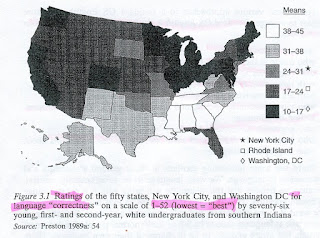The future of English has long been speculated about, and science fiction and fantasy novels and films offer multiple notions about what it might look and sound like hundreds of years from now. Bladerunner (1982) famously offered us "Cityspeak," described in Harrison Ford's voiceover as " gutter talk, a mishmash of Japanese, Spanish, German, what have you." And, as shown in the original screenplay, it was exactly that, including words from Hungarian, Japanese, German, French, and Korean (thought notably not Spanish). However, while it's true that on a drive through LA one can pass through block after block of "Chinatown," "Korea Town," and other such areas, the social forces don't seem to be in place for anything like Cityspeak to evolve any time soon.
Another stab at the future was Anthony Burgess's "Nadsat," the slang he created for the criminal classes in his novel A Clockwork Orange. Nadsat draws from some native English lingo -- schoolboy talk, Cockney rhyming slang, and so forth -- but 90% of it is actually Russian, including some meorable words as "Gulliver" for head (from Russian golava), "lewdies" for people (Russian lyudi), and "droogs" for friends (Russian drug). A few years before he wrote the novel, Burgess and his wife had visited Leningrad, and heard of the problem of violent youths in that city -- but the reals surprise is how well Russian and English work together. A similar blended language, dubbed "Runglish," can often be heard at the International Space Station, which is maintained mostly by US and Russian astronauts/cosmonauts.
Perhaps the most innovative future English was that invented by Russell Hoban for his post-apocalyptic novel Riddley Walker -- the novel is actually written in this language, a degraded, worn-down English known simply as "Tok" (as in "talk" -- Hoban's future is phonetically spelled). It's unfortunate, though, that Tok at times sounds a little too much like the English of rural Yorkshire, with the implication that if such were to become the standard, it would represent a "degrading" of it (then again, Monty Python's famous 'village idiots' seem to have hailed from the North as well). A parallel problem troubles Sandra Newman's new novel The Country of Ice Cream Star, whose future disintegrated English bears an uncomfortable resemblance to Jamaican patwa:
Another stab at the future was Anthony Burgess's "Nadsat," the slang he created for the criminal classes in his novel A Clockwork Orange. Nadsat draws from some native English lingo -- schoolboy talk, Cockney rhyming slang, and so forth -- but 90% of it is actually Russian, including some meorable words as "Gulliver" for head (from Russian golava), "lewdies" for people (Russian lyudi), and "droogs" for friends (Russian drug). A few years before he wrote the novel, Burgess and his wife had visited Leningrad, and heard of the problem of violent youths in that city -- but the reals surprise is how well Russian and English work together. A similar blended language, dubbed "Runglish," can often be heard at the International Space Station, which is maintained mostly by US and Russian astronauts/cosmonauts.
Perhaps the most innovative future English was that invented by Russell Hoban for his post-apocalyptic novel Riddley Walker -- the novel is actually written in this language, a degraded, worn-down English known simply as "Tok" (as in "talk" -- Hoban's future is phonetically spelled). It's unfortunate, though, that Tok at times sounds a little too much like the English of rural Yorkshire, with the implication that if such were to become the standard, it would represent a "degrading" of it (then again, Monty Python's famous 'village idiots' seem to have hailed from the North as well). A parallel problem troubles Sandra Newman's new novel The Country of Ice Cream Star, whose future disintegrated English bears an uncomfortable resemblance to Jamaican patwa:
"My name be Ice Cream Fifteen Star. This be the tale of how I bring the cures to all the Nighted States, save every poory children, short for life. Is how a city die for selfish love, and rise from this same smallness. Be how the new America being, in wars against all hope - a county with no power in a world that hate its life. So been the faith I sworn, and it ain't evils in no world nor cruelties in no read hell can change the vally heart of Ice Cream Star."






